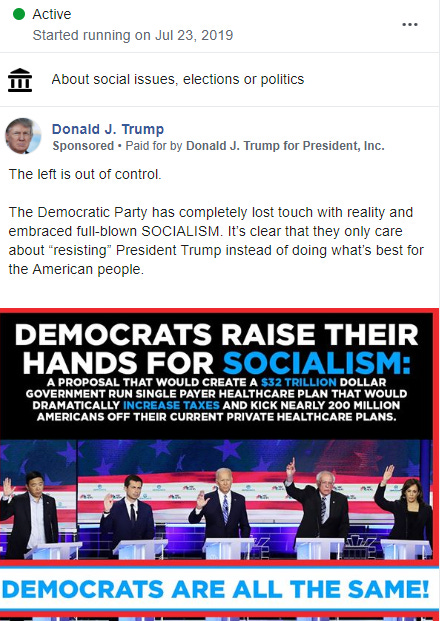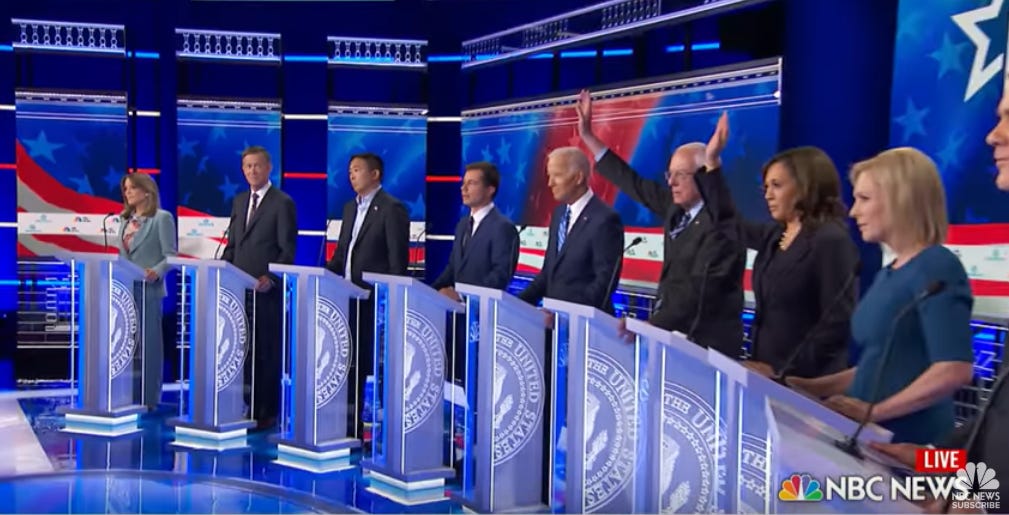Trump using Facebook ads to lie about his Democratic opponents
The Trump campaign has launched a series of new Facebook ads that blatantly lie about the policy positions of several Democratic candidates for president. One ad, for example, claims that Joe Biden, Pete Buttigieg, and Andrew Yang support eliminating private insurance.
The ad shows the three candidates, along with Bernie Sanders and Kamala Harris, raising their hands with the caption "DEMOCRATS RAISE THEIR HANDS FOR SOCIALISM." The ad goes on to claim that the candidates are raising their hands in support of a proposal to "kick nearly 200 million Americans off their current private healthcare plans."

During this debate, moderator Lester Holt did ask the candidates, through a show of hands, to indicate whether they supported eliminating private insurance.
Let’s talk about healthcare. And this is going to be a show of hands question...Many people watching at home have health insurance of their employer. Who here would abolish their private health insurance in favor of a government-run plan?
This is an actual screenshot of how the candidates responded.

Buttigieg was given a chance to answer in more detail and specifically said that he would maintain the private insurance market and allow a "public option" to compete with commercial offerings.
I would call it Medicare for All Who Want It. you take something like Medicare, a flavor of that, and you make it available on the exchanges it. People can buy in. And then if people like us are right that that will be not only a more inclusive plan, but a more efficient plan than any of the corporate answers out there, then it will be a very natural glide path to the single-payer environment.
Biden also responded in more detail and said he also would offer a public option while also maintaining the private insurance market.
The fact of the matter is that the quickest, fastest way to do it is build on Obamacare, to build on what we did. And secondly, secondly, to make sure that everyone does have an option. Everyone, whether they have private insurance, employer insurance or no insurance, they, in fact, can buy into the exchange to a Medicare-like plan. And the way you do that, you can do it quicker look, urgency matters.
The Trump ad, however, falsely claims that Biden and Buttigieg both support eliminating private insurance. Facebook's ad policies prohibit "false and misleading" ads. But they have not consistently enforced this policy against the Trump campaign, its largest political advertiser.
Facebook did not respond to request for comment.
Kamala Harris said after the debate that she misunderstood the question and does not support eliminating private insurance. Of the Democratic candidates, only Sanders, Elizabeth Warren, and Bill DeBlasio support eliminating private health insurance.
The issue is not whether attributing this view to certain Democratic candidates is politically advantageous to Trump. It might not be. But if Trump is allowed to use the unprecedented reach of Facebook to spread lies about his opponents, it represents a fundamental threat to the integrity of the 2020 election.
Facebook's $5 billion settlement
On Wednesday, the Federal Trade Commission (FTC) announced that Facebook agreed to pay a $5 billion fine to settle the company's massive privacy violations.
Facebook, according to the FTC, "used deceptive disclosures and settings" that undermined user privacy in violation of a previous agreement it signed with the FTC in 2012. The company also told users it was collecting phone numbers for account security, and then used those numbers to target ads. Facebook deceived tens of millions of users by falsely suggesting that its facial recognition feature was not enabled by default.
$5 billion is a lot of money and is far larger than any previous fine imposed by the FTC. But Facebook is so big that the fine is unlikely to be a meaningful deterrent to future privacy violations. The company collects $5 billion in revenue every month. When the size of the fine was first reported, Facebook's stock went up.
The FTC approved the settlement on a 3-2 vote, with the two Democratic FTC commissioners, Rohit Chopra and Kelly Slaughter, opposing the deal. The Democratic commissioners identified several other shortcomings with the settlement.
The settlement does nothing to curb Facebook's surveillance and data collection
The primary criticism of the settlement by Commissioner Chopra is that it does nothing to change Facebook's fundamental financial incentives. The company uses "people’s past behavior to predict and place the ads most likely to influence their future behavior." Therefore, the "more Facebook knows about a user, the more it can accurately determine which ads will successfully achieve the advertiser’s desired outcome." Nothing in the settlement restricts the ability of Facebook to collect and monetize data about users. Therefore, it will still have a financial incentive to violate users' privacy.
"Breaking the law has to be riskier than following it. As enforcers, we must recognize that until we address Facebook’s core financial incentives for risking our personal privacy and national security, we will not be able to prevent these problems from happening again," Chopra concludes.
The settlement lets Zuckerberg and other top Facebook executives off the hook
Commissioner Slaughter argues that, instead of accepting the settlement, the FTC "should have initiated litigation against Facebook and its CEO Mark Zuckerberg" for violating the terms of the 2012 agreement. Instead, the settlement grants Zuckerberg and other executives immunity. Slaughter notes that "[u]nlike most publicly traded companies, he also controls a majority of the company’s voting shares," which makes it similar to "the closely held corporations against which the Commission frequently pursues individual liability."
She also quotes Zuckerberg's 2018 Congressional testimony to prove her point:
But it’s clear now that we didn’t do enough to prevent these tools from being used for harm, as well. That goes for...developers and data privacy. We didn’t take a broad enough view of our responsibility, and that was a big mistake. It was my mistake, and I’m sorry. I started Facebook, I run it, and I’m responsible for what happens here.
Chopra agrees, noting that "Facebook’s officers and directors were legally bound to ensure compliance with the 2012 order." Under the law, "officers and directors cannot avoid responsibility under these orders simply by burying their heads in the sand as their subordinates break the law."
The settlement grants Facebook blanket immunity for all conduct before June 2019
Facebook is a massive and largely opaque company. There is no guarantee that the FTC has discovered all possible wrongdoing in the course of its investigation. But the settlement provides Facebook with blanket immunity not just for the wrongdoing that the FTC uncovered, but anything else that occurred before June 2019.
Chopra says that the decision to grant Facebook immunity for unknown violations deviates from standard FTC practice. "Given the many public reports of problems at Facebook, it is hard to know how wide the range of conduct left unaddressed in the proposed Complaint or settlement maybe. This shield is good for Facebook, but leaves the public in the dark," he said.
Thanks for reading!



Facebook has become the unofficial propaganda arm of the Republican Party.
As I recall, the raising of hands for Biden, Buttigieg, and Yang was in response to a question for all candidates about whether their plan would provide coverage for undocumented immigrants. I mean, that could be its own attack ad and be more genuine (though, of course, still reprehensible). Curious as to why they chose to edit this ad as an attack on the subject of health care when immigration is Trump's central issue, but obviously, both are concerns for Americans irrespective of political affiliation. Either way, your focus on Facebook is well warranted and I wonder if they will truly ever be held accountable.